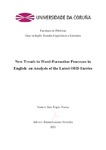New Trends in Word-Formation Processes in English: an Analysis of the Latest OED Entries

Use este enlace para citar
http://hdl.handle.net/2183/29778Coleccións
Metadatos
Mostrar o rexistro completo do ítemTítulo
New Trends in Word-Formation Processes in English: an Analysis of the Latest OED EntriesAutor(es)
Director(es)
Lezcano, EmmaData
2021Centro/Dpto/Entidade
Universidade da Coruña. Facultade de FiloloxíaDescrición
Traballo fin de grao (UDC.FIL). Inglés: estudios lingüísticos y literarios. Curso 2020/2021Resumo
[Abstract] It is widely accepted that language changes; this change goes simultaneously with the evolution of the world. Phonetics, morphology, syntax, semantics or pragmatics have evolved and then been examined by linguistics. Word-formation processes have been a widely studied issue because of its complexity and interest; recently, the new tendencies in word-formation patterns have been a recurrent subject of study but have not been explored in great depth. This paper aims to analyse the 712 words included in the Oxford English Dictionary (OED) during 2020 in order to obtain a pattern of the most dominant processes of formation of new words and the essential semantic fields. To this end, some previous knowledge of word-formation was essential, in addition to the need to refer to those few studies on the latest trends. Access to the OED was then required, and, by using the list with the words provided by the OED, an analysis of word-formation processes and semantic fields was carried out. But first, a selection of different sources was needed for the overview of the diverse word-formation processes. My findings show that word formation processes have changed but perhaps not as much as expected: traditionally, compounding and affixation were the most important processes, and this continues to be this way. Nevertheless, new processes are becoming more important –clipping, blending or conversion–; at the same time, some others appear to be quite unproductive –initialisms, acronyms, reduplication or back-formation–. Besides, borrowing has been fundamental in the production of new words and its importance will be mentioned in this study, although it is not really a word-formation process. As a result, language changes but very slowly, and the so-called minor word-formation processes are these days more important than, for instance, during the Old English period.
Apparently, both word-formation processes and semantic fields continue to be quite traditional and not much modification has taken place. Ease is going to influence the selection of the processes of formation of new words; for instance, compounding is much easier and then more productive than blending. Moreover, many words come from specialized fields –linguistics, gastronomy, fashion, health–, whereas semantic fields –such as Internet and technologies–, which were expected to be more dominant, are not so essential. Further research could be carried out with the focus on words related to a particular semantic field, for instance, health. Studying words specifically related to the pandemic would also be valuable since Covid-19 has not finished yet. Other lines of study could also possibly delve into the patterns of formation of clippings or blendings or into the analysis of the many borrowings that were included during the referred year.
Palabras chave
Derivational morphology
New words
Productivity
Semantic fields
Word-formation processes
Oxford English Dictionary (OED)
English Language
New words
Productivity
Semantic fields
Word-formation processes
Oxford English Dictionary (OED)
English Language
Dereitos
Os titulares dos dereitos de propiedade intelectual autorizan a visualización do contido deste traballo a través de Internet, así como a súa reproducción, gravación en soporte informático ou impresión para o seu uso privado e/ou con fins de estudo e de investigación. En nengún caso se permite o uso lucrativo deste documento. Estos dereitos afectan tanto ó resumo do traballo como o seu contido Los titulares de los derechos de propiedad intelectual autorizan la visualización del contenido de este trabajo a través de Internet, así como su repoducción, grabación en soporte informático o impresión para su uso privado o con fines de investigación. En ningún caso se permite el uso lucrativo de este documento. Estos derechos afectan tanto al resumen del trabajo como a su contenido





